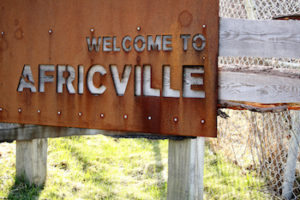
*On this date in 2002, the Registry celebrates Africville, Nova Scotia.
This was Canada’s oldest Black settlement (dating back to the 18th century) and was last preserved as a Canadian Historic Site in 2002. Africaville was a small Black community in the north end of Halifax. When we think of Nova Scotia and the Maritimes, we think of the salt sea air and the fishermen. When we think of Canadian Black History, we think of the Underground Railroad and individuals like Harriet Tubman, who assisted slaves in escaping to freedom in Canada. So why do we rarely put these two images together? Many textbooks that teach us about slavery and the history of Blacks in Canada seldom, if ever, mention one of the most critical stories in Canadian Black History: Africville.
Their story is unique; many families who settled there can trace their origins back to the late 1700s. Many others say Black slaves from America established it after the War of 1812. It was officially founded in 1838. Regardless, these African people were among the first settlers in Nova Scotia. According to Parks Canada records, the population of Africville never exceeded 400 people, derived from up to 80 different families. It was a tight community of law-abiding, tax-paying, mostly Baptist citizens who did their best to survive in the conditions they were forced to live in by the Canadian government.
Despite Canada's healthy reputation for equality and the anti-slavery movements, the downfall of Africville shows another side of the story. Simply put, the government made life miserable for its Black citizens decades before the city of Halifax bulldozed Africville to the ground. Due to unequal political rights and discrimination, the residents of Africville had no say in what came to pass within their community. The city developed a series of industrial facilities around the community’s borders, including a prison, night soil disposal pits, an Infectious Disease Hospital, a waste disposal site, and an incinerator.
As a result of these industries and a lack of sewage, water, and lights, Africville was distinguished as a dirty, lawless slum. In reality, it was a group of heart-bound citizens striving to survive while being systematically treated like lower-class citizens. In the 1960s, Halifax initiated post-war renewal projects to revitalize the city and sought to clear the area where Africville stood. Canadian government officials offered the residents of Africville alternative places to live, jobs, and economic opportunities in exchange for tearing down their homes; however, the residents resisted, and having no legal recourse, the city went through with the demolition anyway. Many citizens were shipped off to slum housing, their personal belongings transported to their new locations in city garbage trucks, and they were given less than $500 in compensation. Bulldozers leveled the entire community; houses, stores, businesses, and even the church were all destroyed in the dead of night.
The site where Africville once stood is now an underused park. It is a memory of the spirit of Africville, a small yet modest and solid community that survived hundreds of years of neglect and turmoil. The surviving citizens now put their efforts into recovering the community's history and amazing spirit. Irvine Carvery, head of the Africville Genealogy Society, and others hold annual reunions to support their efforts to recover their heritage.
Richards, Phillip M. Best literature by and about Blacks.
Detroit: Gale Group, c2000. vii, 330 p. 016.8109896073 RIC
Black writers: A Selection of sketches from Contemporary authors. Detroit: Gale Group, c1999. vii, 330 p. 016.920009296073 BLA
Returning the gaze: Essays on racism, feminism, and politics. Toronto: Sister Vision Press, 1993. xxiv, 266 p. 305.48 RET
Alexander, Ken. Towards freedom: The African-Canadian experience. Toronto: Umbrella Press, c1996. 288 p.: ill. 305.896 ALE